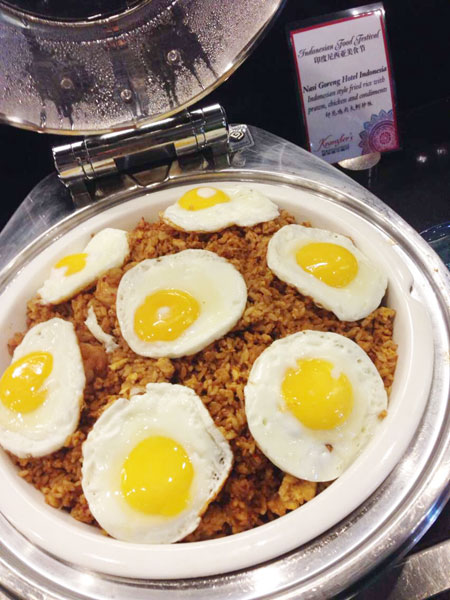Spicy encounter with Indonesian cuisine
 |
|
Nasi goreng (fried rice) topped with egg. [Photo/China Daily] |
Other must tries on the menu, he says, are oxtail soup known as rawon Surabaya, made with black nuts he brought from Jakarta in paste form, and opor kuning, a spicy chicken soup redolent with coconut, lemongrass and tamarind.
Arabic influences abound in the cuisine of the world's most populous Muslim country, especially in Sumatra-a hub of the ancient maritime spice trade-and Aceh, where the strongest Arabian legacy colors the culture today. In other areas, Budi notes, Buddhism has influenced the food: Indian traders first came to Bali around 200 BC. The Indonesian islands known as the Moluccas were dubbed "the Spice Islands" by European traders hundreds of years ago.
There is rijsttafel from the Dutch era as well as many contributions from Chinese, the country's largest ethnic group, including noodles, meat and fish balls, and spring rolls.
"Despite differences there is oneness" has become the motto of Indonesia, and it resonates from the broad social fabric to the family dinner table.
"The taste of Indonesia is everyone's taste," says Soegeng Rahardjo, the country's recently arrived ambassador to China. He notes that CNN recently ranked three Indonesian dishes among the top 15 after polling its audience in its World's 50 Best Foods survey. That list had beef rendang in the top spot and Indonesia's version of fried rice, nasi goreng, at No 2.
"Indonesia is a land of diversity," he adds. "From one island to another, the people's tastes are different, like the colors of the rainbow."
Chef Budi literally sees that color on the plates he creates with his fellow guest chefs at the festival, Sri Haryatun and Sugeng Prayitno, and celebrity guest chef and TV cooking show host Farah Quinn.
"Indonesian food is set apart by lots of different herbs, but they are chiefly employed in three blends or bases," Budi says. The yellow base is dominated by garlic, kanda nut and turmeric; the white base drops the turmeric; the red base adds spicy red chili paste.
Beef randang, sambas and skewers of beef and chicken satay have become familiar a round the world, but a festival like this one offers Beijingers a chance to color their palates with an amazing array of flavors.
IF YOU GO
Indonesian Food Festival
Through April 19; Lunch or dinner buffet 298 yuan ($48), Sunday brunch 498 yuan.
Kranzler's Restaurant at the Kempinski Beijing. 50 Liangmaqiao Road, Chaoyang district, Beijing. 010-6410-4222.
About this series
China Daily is featuring different cuisines from countries along the Silk Road every Thursday.
















